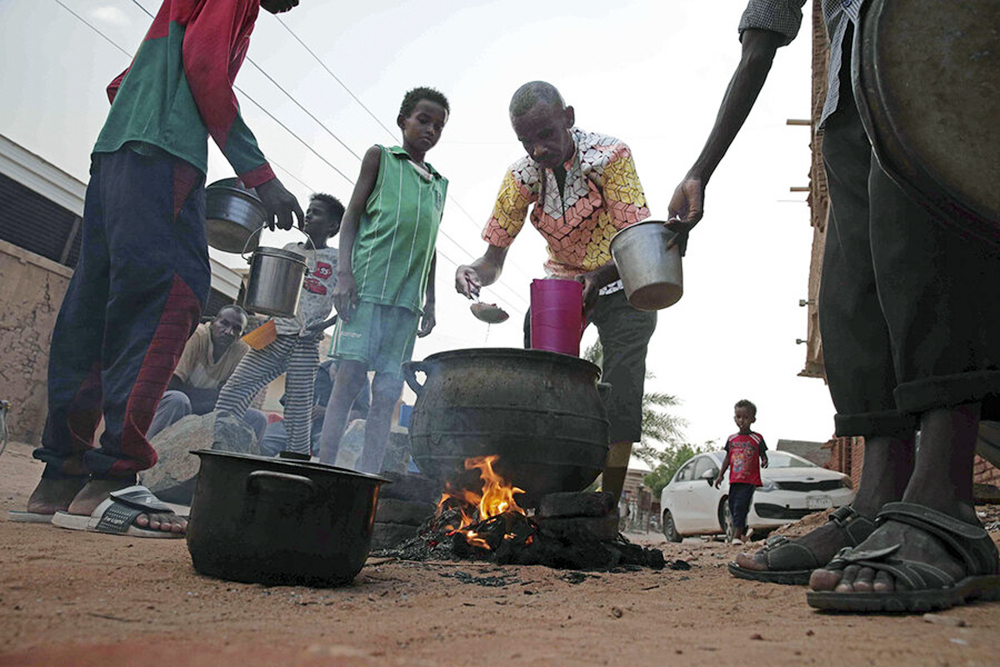
The Ladaya Turns the Capital into a Village
Ali Taher
The Athafi are the stones on which the cooking pot is placed, and they are the oldest cooking method. Here in Sudan, they are called Ladaya and are widely used in rural and Bedouin communities before the war imported them to the capital, Khartoum, and Ladaya became an essential cooking method that spread inside houses and on the streets.
Amani Mergani and her sister Omaima are skilled in cooking and preparing various Sudanese dishes. However, for the first time in their lives, they are using Ladaya after the electricity supply in Al-Haj Yousif in Bahri city was cut off for 8 days, during which all forms of energy disappeared and charcoal vanished. They had no idea that it was the ancient method of cooking legumes until these unfortunate days of war.
However, the Ladaya, the third of the Athafi, was not the only thing that changed the lifestyle in the shattered Sudanese capital. Many of the life tools have turned Khartoum into a primitive village living in the Middle Ages. This was confirmed by Essam Al-Malik, who said that the appearance of Khartoum has become a village and its lifestyle is rural. Citizens no longer use cars, but instead rely on carriages, tuk-tuks for communication, transportation, and transferring patients and the bodies of the deceased to the cemeteries. As for food, it has been limited to (Kurrasa, Kisra, and Asida) in addition to rice, which recently entered the Sudanese table, which has become poor in terms of meat dishes, both red and white. He said, In Khartoum, we live a village life in every detail. Nothing here gives a feeling of the modern life aspects that have stopped and been cut off for more than six months since the outbreak of the cursed war.
At the edge of Hala Koko market in East Nile, a young man came out with a wheel carrying a bag of sugar and a number of plastic bags filled with vegetables. This rural scene was astonishing in the capitals neighborhoods and called for a spectacle, but today it has become normal and does not attract anyones attention, just like the carriage owners who carry patients on the back of the vehicle to hospitals at symbolic prices and sometimes for free.
Isa Adam says: A man was injured in the street by an unknown projectile in the May area, south of Khartoum. We could not find a quick way to save him to the hospital, so we had to transport him on the back of a Dardaka, like a carton. This is how war is; it doesnt give humans any value.
He adds: The life of villages and countryside is better than ours here in Khartoum, which has frighteningly regressed and become primitive, with all modern means of life disappearing. Cars have become a curse after they were a blessing. People forgot about hot dogs, sausages, broast chicken, and no one remembered soft drinks Pepsi, Miranda, and Coca-Cola, and there are no queues for the cursed gas. Everyone who remains in the neighborhoods of Khartoum cooperates in everything, even food has become village-like and follows what is known as Nafeer (collective work).
The situation has reached a point where the rural residents of Khartoum watch cars with astonishment. They wish to ride the tuktuk, which has rebelled against the transportation system and has become able to meet delivery requests at high cost due to the increase in the value of gasoline. The majority of the population relies on bicycles as a legitimate means of transportation. On the outskirts of the capital, donkeys have shown unusual bravery, filling the gap in transportation under the sounds of artillery and bullets without fear after the disappearance of transport vessels.
At the bakeries and ovens of Khartoum, the bread is piled up on the table after the demand for it has decreased because the majority here now mainly rely on (Kurrasa, Kisra, and Asida), which is the oldest line of popular dishes in ancient and modern Sudanese societies.

